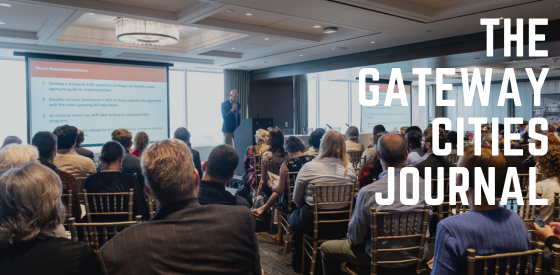The MassINC Policy Center released new research this week that finds one-in-five Gateway City workers has limited English proficiency. Helping these residents improve their English skills by just one level would inject $1.5 billion into Gateway City local and regional economies. Unfortunately, state and federal funding for ESOL services hasn’t kept pace with growth in our immigrant population over the past two decades. Many Gateway Cities now have many more people on waiting lists for publicly funded adult ESOL classes than total seats available in local programs. Due to changes to federal financial aid policies, most community colleges no longer offer basic English courses. And vocational ESOL classes that help immigrants gain the English skills required for specific occupations are severely limited in regions throughout the state.
At a Beacon Hill event hosted by MassINC on Wednesday, leaders shared strategies to address these systemic shortcomings. Dr. Noemi Custodia-Lora, who directs Northern Essex Community College’s Lawrence Campus, described the operation of the city’s unique ESOL taskforce. Convened by the mayor, more than 20 providers coordinate to understand how many adult students are waiting for English classes at any given point in time, and how existing capacity corresponds with their needs and aspirations. Cross-sector coordination also helps Lawrence ensure that all programs have high-quality curricula and instructors with proper training.
From an economic development standpoint, workplace-based ESOL is one of the most powerful delivery modes. Students can get the skills they need on the job, and employers can use ESOL both as a recruitment tool and a means to make their workforce more productive. While Massachusetts has long offered public matching funds for workplace-based ESOL, smaller employers in Gateway Cities have difficulty accessing these dollars, as Vivian Iannotti, CEO of Chelsea-based Stop and Compare Market noted. Tom Hooper, Vice President of Sector Pathways for Commonwealth Corporation, encouraged cities to form consortiums to help small businesses apply for these state dollars and put them to good use. (As described in our last report, this is exactly the kind of role we envision district management organizations playing to help main street businesses thrive).
This new research also intersects with recent MassINC work on digital equity. The shift to remote instruction during the pandemic demonstrated that this population can take full advantage of online, and hybrid course offerings, if we help them access reliable internet service and capable computing devices. Taking full advantage of our substantial digital equity investments to provide quality ESOL services to a growing immigrant population will require detailed plans at both the state and regional level.
A note of gratitude to Ashley
For the past five years, the Gateway Cities Journal has been expertly prepared and presented to you by Ashley Guerra-Agramonte. A native Lawrencian, Ashley brought a passion for the communities and people of our Gateway Cities to MassINC. She has helped bring us together via this communication channel, as well as through the annual Gateway Cities Innovation Summit and dozens of other public events that she took the lead organizing in communities all over the commonwealth. We thank her for her tremendous service, and wish her the best of luck with her next endeavor in Austin, TX.
In other news
Housing and economic development
- Brockton Mayor Robert Sullivan says the renaissance taking place in his community is proof that investing federal, state, and local housing dollars in Gateway Cities makes sense. Meanwhile, the city council mulls changes to development rules for the 66-acre Old Fairgrounds site, the last major undeveloped parcel in the community.
- Haverhill approves a TIF agreement to help developer Sal Lupoli replace the massive Goecke parking garage on Merrimack Street with a $160 million mixed-use development.
- Petitioners withdraw a proposal to establish a downtown business district in New Bedford.
- The developer behind the private portion of the Polar Park redevelopment in Worcester submits a bid to host the State Police Central Massachusetts crime lab.
- Advocates raise concerns about the proposed MassDevelopment/Mass Growth Capital merger, and the way that the combination is unfolding without any public debate.
- A new report from the Pioneer Institute says visa caps and red tape stifle immigrant entrepreneurship in Massachusetts.
- The costs of housing and transportation continue to hit Bay State residents, a new survey from the MassINC Polling Group shows.
- The Urban Institute will host a forum on how large-scale industrial policy investments can grow regional small businesses.
Education
- Approximately 10 percent of the state’s workforce has limited English proficiency and there is a gap in access to English language learning services due to a lack of state and federal funding, which hasn’t kept pace with the number of foreign-born people arriving to the state.
- The New Bedford Light examines school segregation through the eyes of a travelling sea gull.
- Holyoke’s school superintendent says more must be done to address school segregation.
- The Educator Diversity Act moves forward in both the House and Senate economic development bill. Latinos for Education continues to lead the advocacy for its adoption.
Health & environment
- With greenhouse gas emissions declining, Worcester officials think they can make their net zero carbon emission goal by 2045.
- Low-income Chelsea residents who received $400 each month early in the pandemic saw an 87 percent decline in ER visits for substance abuse and behavioral health. As pandemic funds run out, direct cash assistance programs like those implemented in Chelsea and Cambridge are difficult to fund.
Communities & people
Discover Central Mass launches Passport to Summer Fun.
The Gateway Cities Journal is made possible by the support of our sponsors

Get the latest updates on policy issues impacting Gateways Cities delivered right to your inbox.
The Gateway Cities Innovation Institute strengthens connections across communities and helps Gateway City leaders advance a shared policy agenda.
